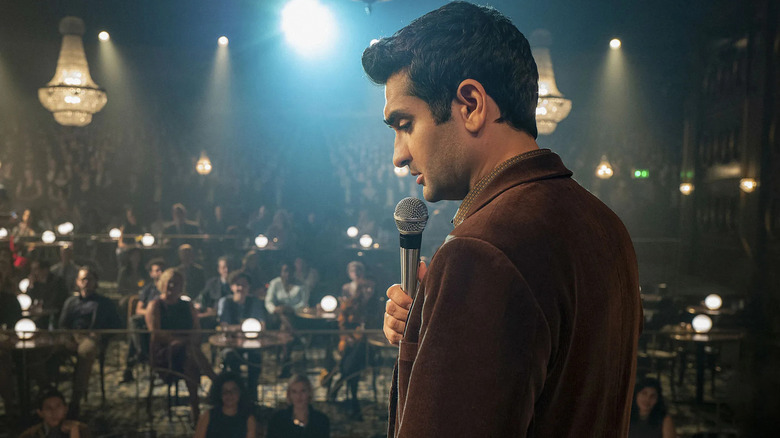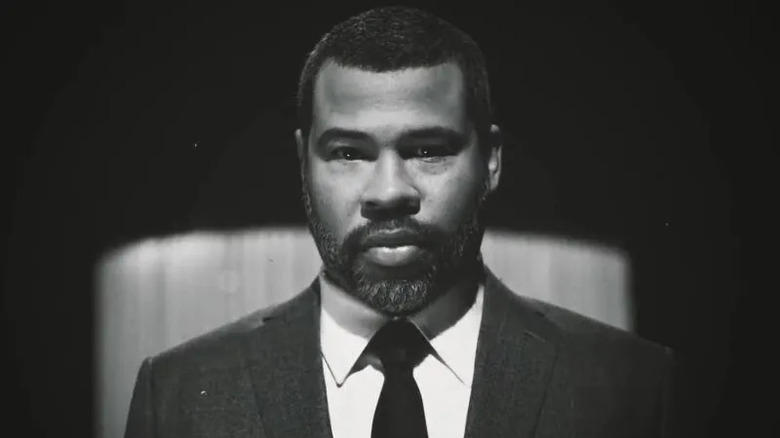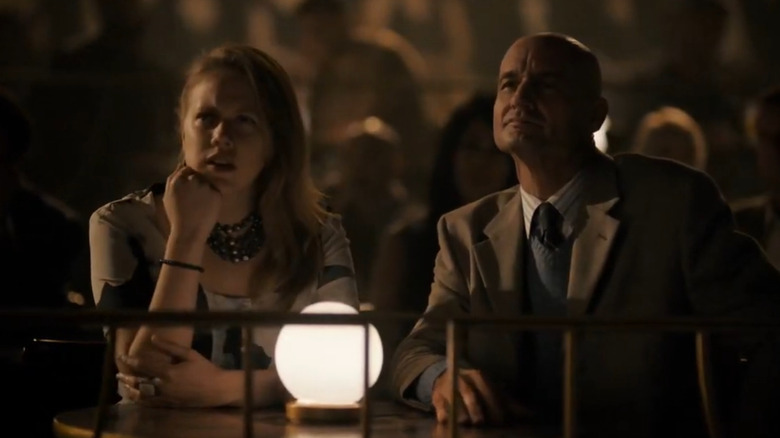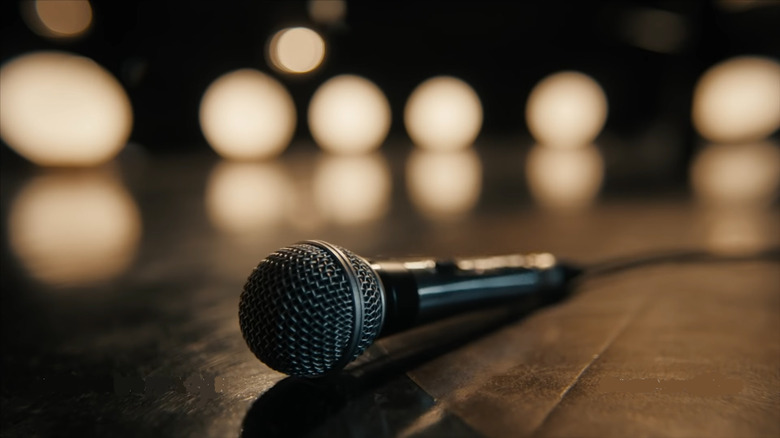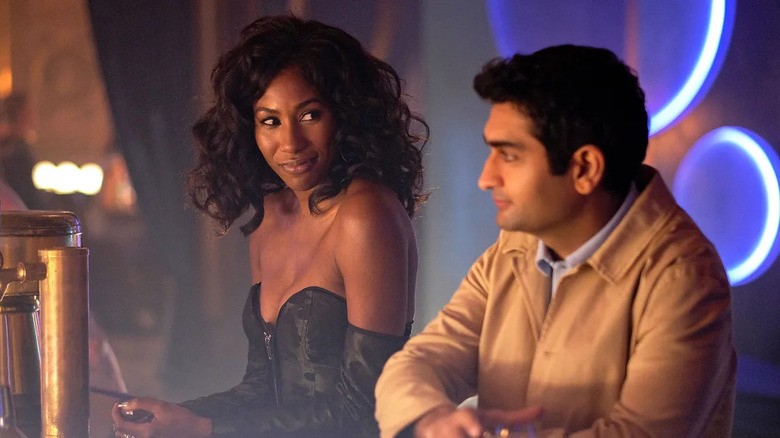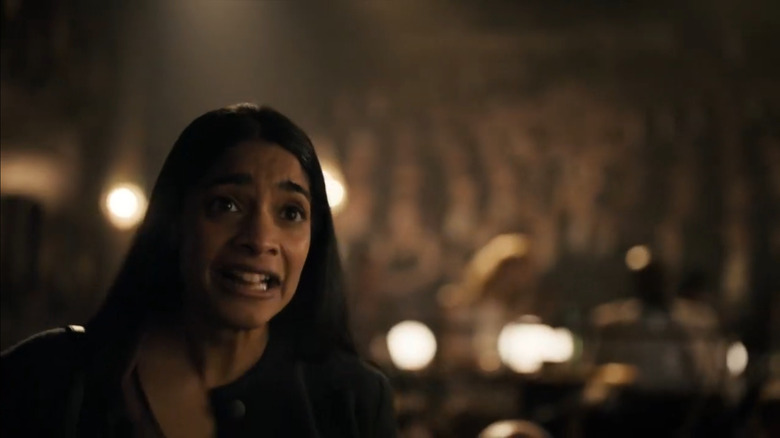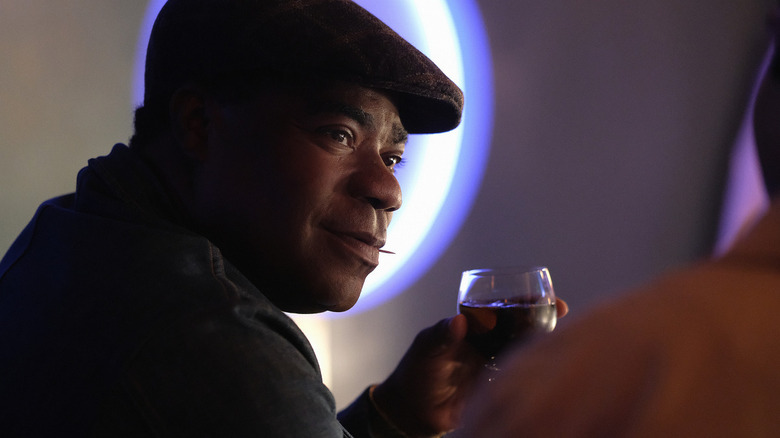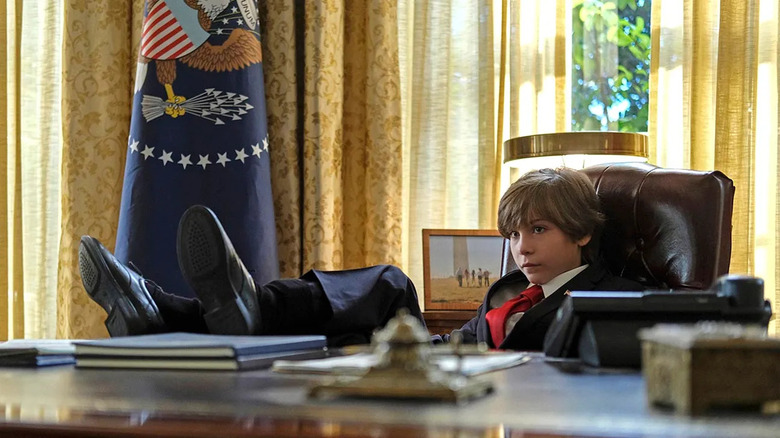One Of The Most Controversial Twilight Zone Episodes Demands A Second Look
As a viewer born in the blurred area between Millennial and Gen Z, my relationship with "The Twilight Zone" has always been complicated. I love the original series, and definitely consider it to be stronger than any of the revivals, but I'm also frustrated with the sheer extent to which its flaws are glossed over. Despite what haters of Jordan Peele's 2019 revival might tell you, Rod Serling's original run wasn't shy of the occasional bit of preachy writing. It also had no shortage of clumsy exposition or questionable acting, as well as the occasional twist ending that either barely made sense or was way too easy to predict. The classic series has plenty of gems (my personal favorite's probably season 1's "Mirror Image," or maybe season 3's "It's a Good Life"), but as Rod Serling himself will tell you, it had plenty of clunkers that were simply forgotten over time.
This dissonance was the biggest obstacle the 2019 revival of "The Twilight Zone" had to deal with. It wasn't just that the show had to match up to the quality of the original show; it also had to match up to the version of the show that existed in fans' minds, where every single episode was a banger, a work of unparalleled genius.
There was also the issue that the more controversial aspects of the classic show, like Rod Serling's fairly unsubtle left-wing political commentary, is often downplayed by modern fans. Because so many viewers watched the classic series as a kid, they still remember it with the apolitical lens of a child. The political approach of the "Twilight Zone" reboot felt like an affront to some nostalgic fans, even though it was largely staying true to the show's progressive roots.
The Twilight Zone revival wasn't great, but it started off strong
To be fair to the revival haters, it's not like the political commentary of 2019's "Twilight Zone" was beyond reproach. Even by the classic series' standards, episodes like "Not All Men" and "Replay" were absurdly unsubtle, and episodes like "The Wunderkind" did itself no favors by throwing in a played-out Trump metaphor despite seeming afraid to say anything new or meaningful about him. It didn't help that "Black Mirror" had already firmly established itself as the modern day "Twilight Zone" successor. Whereas the '80s "Twilight Zone" revival just had to escape one show's shadow, this revival had to escape two.
That's why I was so pleasantly surprised to watch the debut episode, "The Comedian," which was co-released on YouTube in a failed attempt to reel viewers into subscribing to CBS All Access. It was a moody, evocative episode about a struggling comedian who makes a deal with the devil to finally get some good laughs. The only problem is that when he uses people for material, they're erased from real life. "The Comedian" does everything a good "Twilight Zone" episode is supposed to do, taking a fun speculative premise and letting a flawed person handle it in a relatably terrible way.
It also featured some delightfully unhinged performances from Kumail Nanjiani and Tracey Morgan, not to mention a ton of inspired directing choices from Owen Harris, the guy who also directed some of the best "Black Mirror" episodes. I remember watching "The Comedian" and being amazed that the revival had actually done it: they'd revived "The Twilight Zone" in a fresh, modern, exciting way.
Then I went online, and discovered that everyone else in the world hated it.
The Comedian's bad reviews
Viewers at the time complained that the episode wasn't filmed in black and white (why would they still do that?), that the characters cursed too much (they're raunchy comedians at a seedy club), and that the jokes Samir told on stage were never funny (they weren't supposed to be). They also complained that the episode had too many similar elements to "Death Note" or "The Shining," as if most of the original show wasn't also riffing on pre-established speculative stories.
Most of all, they complained the episode was predictable. "It was obvious how it was going to play out by minute five," one viewer said, "which can be ok when it's a 22 minute episode. But at 55 minutes, it was just a slog." This is the most sympathetic critique for me, as "Twilight Zone" fans have good reason to be skeptical of extended runtimes. When season 4 of the original show moved to a full-hour time slot, the series definitely suffered as a result.
But for "The Comedian," the extended runtime was a clear strength, giving the episode time to portray Samir's slow, nuanced descent into insanity. When mischievous comedian/devil J.C. Wheeler gives Samir the ability to erase people from existence with his stand-up material, we only buy Samir's willingness to use this power because we've seen just how painful his regular stand-up can be. This is a story about a person with morals trying and failing to hold onto them. His quasi-murder rampage near the end doesn't work if he jumps into it straight away.
Some fun social commentary done right
"The Comedian" smartly has Samir start out only erasing people by accident. Then he only erases bad people. Then he erases people who've annoyed him, and only then does he start recklessly erasing everyone he's ever known. The point of "The Comedian" is not to surprise, but to fill you with dread; it knows we know where this story's heading, and the horror is in forcing us to watch it all unfold anyway. It's pretty obvious that Jack Torrance will go crazy from the first few scenes of "The Shining," but that movie's beloved because of how predictable its main storyline is, not in spite of it.
The extra time also allows the episode to weave in the social commentary in a much smarter way than it gets credit for, not to mention in a much cooler way than the rest of the revival would do. "Twilight Zone" fans complained about the bluntness of Samir's anti-second amendment rant in the show's opening — apparently not getting that his speech is an example of his terrible comedic skills, not something for us to nod along with — but they tended to miss out on the more subtle ongoing thread of cancel culture and how it apparently works. We're forced to watch as Samir attempts to only use his erasing powers on "bad" people, cancelling them from existence allegedly out of genuine righteousness, but really for his own self-gain.
This is the commonly-understood caricature of what cancel culture is, but "The Comedian" doesn't settle for anything so easy. It instead establishes that Samir can't just erase some racist on the street; he can only erase the people he already knows.
An episode filled with surprising, nuanced takes
"The Comedian" understands that "canceling" is only really effective if it comes from one's own community; an apparent liberal like Samir doesn't have the power to cancel a white supremacist, for example, but he does have the power to cancel his fellow liberals. It's a much smarter depiction of the issue than most satirical shows at the time were doing. It understands that in-group shaming and shunning of an individual can be a pretty severe social problem, but it doesn't subscribe to the cancel culture narratives right-wing figures so often espouse.
The extended length of the episode also affords it time to dive into a sharply-examined critique of stand-up culture: the trend of comedians acting like philosophers instead of comics, aiming for applause rather than laughter. Samir Wassan is someone who's introduced trying to use the art of standup comedy as a vehicle to straightforwardly rant about his political views. The episode doesn't outright condemn him for this, but it's critical of his approach, treating it as something that's borne out of misguided optimism at best and delusional narcissism at worst.
Fans back in 2019 often interpreted the early line about Samir not wanting to "compromise his beliefs for a cheap joke" at face value, but it wasn't supposed to be taken that way. Samir's view of himself as a deep thinker is a shallow façade: less a sincerely-held belief and more a coping mechanism for when his jokes bomb. It's the fact that Samir doesn't actually believe in the social justice potential of comedy that he's able to be corrupted so easily.
The Comedian's biggest takeaway: art involves sacrifice
The episode's strongest thematic throughline is its meditations on the exploitative nature of art in general. Most artists have struggled over how much of their personal lives they should draw on, and how to deal with the awkward (and potentially devastating) social repercussions that follow. Comedians in particular are often expected to be authentic, amusing the crowd with real stories from their lives — but using your friends and family for material can come at a cost.
"The Comedian" takes this dilemma and dials it up to eleven. By mocking his friends and family members, Samir isn't just taking advantage of them; he's blipping them out of existence for the sake of a cheap joke. What's worse is that Samir isn't just exploiting those around him, he's exploiting himself. With every laugh he gets, he's a little bit lonelier, a little less in control of himself and his life.
It's a storyline that cuts especially deep for anyone familiar with the boom of personal essays in the 2010s, in which struggling writers were (and still are) often encouraged to write absurdly personal, detailed essays about traumatic periods of their life. There is no trauma too painful to not be turned into a viral personal essay, it seems, and no personal story too embarrassing to hold off on. There's genuine value in being fully open about the messy, taboo areas of one's life — especially as far as the publication's profits are concerned — but is it worth it for the author?
For Samir, the answer's a clear no. He ends up miserable and alone, repenting only by erasing himself and undoing the damage his comedy's unleashed upon his world. On the bright side, he gets some good laughs as he does it.
A great episode, providing you don't nitpick it.
As viewers were happy to point out at the time, there were a lot of things that didn't quite make sense about the episode. If the subjects of his stand-up disappear from existence the moment the joke ended, then what happens if his audience tries to remember anything from his stand-up? The episode throws in a mention of Samir's growing social media presence, which raises the question of what exactly would happen if you posted a video of his comedy online. Will footage of his jokes still work?
One particular hang-up among fans was Samir's choice to sacrifice himself at the end, rather than try to erase J.C. Wheeler, the comedian/demon who gave him these powers in the first place. While it's fair to say that Samir probably should've at least attempted this strategy (though I doubt it'd have worked), the complaint feels like a case of analyzing the episode in an overly-logical, literal way.
Pretty much every "Twilight Zone" episode has operated under a quasi-fairytale logic, written under the assumption that audiences could appreciate the story on a psychological level, not a realistic one. Here, that means it wouldn't fit for Samir to escape his fate via clever loophole; he has to genuinely atone for his sins in a dramatic, reconciliatory gesture. Watching him embrace his death at the end is riveting TV, whereas watching him outsmart J.C. Wheeler wouldn't have been. (It helps that the music and cinematography during Samir's self-sacrifice is undeniably haunting and beautiful.)
Even the best classic episodes could be nitpicked just as easily as "The Comedian," but audiences (in the '60s and today) seem far more willing to meet those episodes where they're at. The 2019 revival was given no such luxury.
Unfortunately, the rest of the Twilight Zone revival's not as good
"The Comedian" ends with two other satisfying gut punches: the implication that Samir's rival comedian Didi Scott (Diarra Kilpatrick) is about to fall into the same trap set by J.C. Wheeler, and the reveal that Samir's forgotten soul has been trapped forever in the paintings on the comedy club's walls. It's a fun nod to "The Shining," as well as a chilling reveal that the tragedy we've just witnessed has happened hundreds of times already. The episode does everything a good "Twilight Zone" episode is supposed to do, with a fun thought-provoking storyline and a handful of poetically ironic reveals near the end. Once you removed the nostalgia bias, it should've been clear that the revival was off to a good start.
Sadly the rest of the show didn't quite hold up. The cinematography was still beautiful (especially when the black-and-white edition was released soon afterward), but most of the episode's endings often fell flat, and the social commentary often grew increasingly blunt and uninteresting. There are still plenty of gems in the revival worth watching — definitely check out season 2's "Meet in the Middle" — but nothing quite wowed me as much as "The Comedian" did as the show's first impression.
With everything going against it, this "Twilight Zone" revival needed to be amazing to beat out the naysayers. Unfortunately it was only average, give or take a few occasional strokes of brilliance. Still, the series was worth it for that delightful first episode alone: a pilot episode unfairly straddled with sixty years of nostalgia-warped expectations. "The Comedian" is a total gem, and hopefully one day it'll get the appreciation it deserves.
